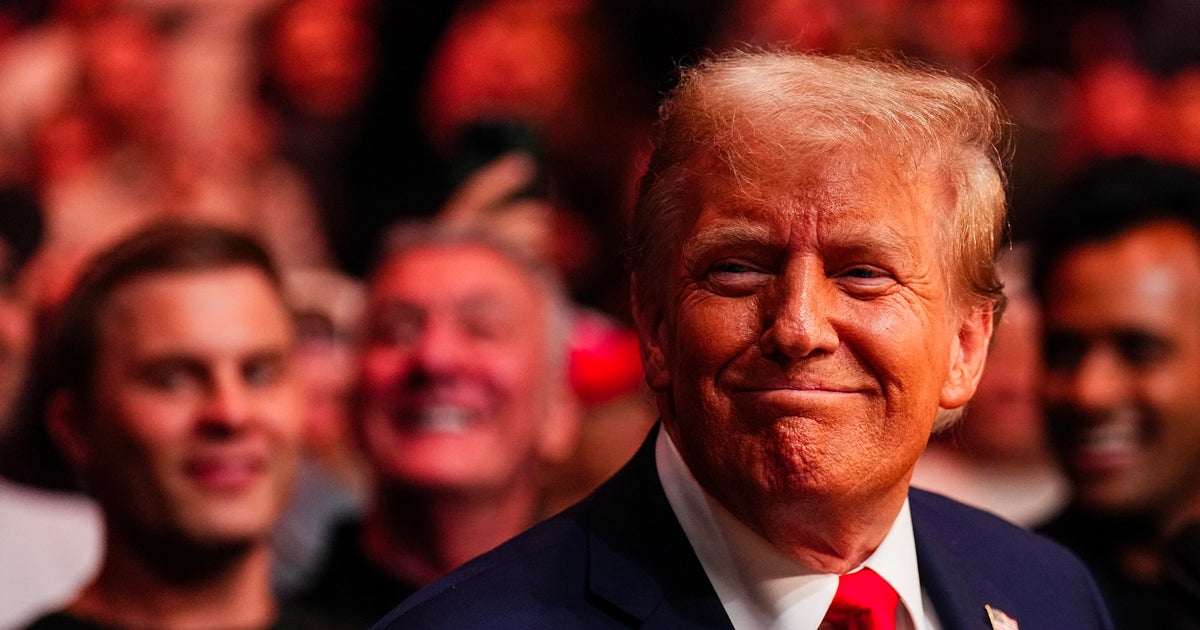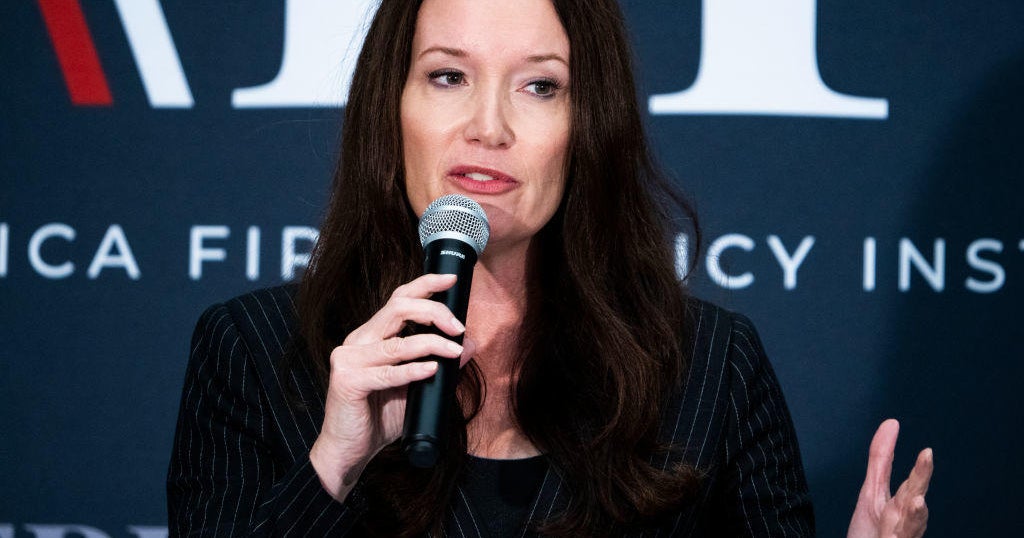CBS News
Stocks roar out of the gate after Donald Trump election win

Stocks and other financial assets are surging after Donald Trump was projected as the winner of the U.S. presidential election and the Republican party gained control of the Senate.
The Dow Jones Industrial Average shot up more than 1,200 points, or nearly 3%, in early trading Wednesday, while the broader S&P 500 and tech-heavy Nasdaq Composite each gained more than 2%.
Many investors expect Trump’s victory to lead to faster economic growth and more market-friendly policies.
“The markets are scrambling to figure out what happens next, but for the time being, the market is pricing in a higher growth and higher inflation outlook,” Peter Esho of Esho Capital said.
The price of bitcoin jumped nearly 8% to a record $75,345 before falling back slightly. Trump pledged support for cryptocurrencies during the campaign. Shares of the crypto exchange Coinbase rose 18% and almost all cryptocurrencies surged higher, including dogecoin, which jumped 17%.
Bank stocks, which could benefit from less restrictive regulations, rose in premarket trading. JPMorgan, the world’s biggest bank by assets, gained nearly 7%. Capital One rose 11.3%.
Tesla, led by Trump supporter Elon Musk, jumped nearly 13%. The company’s size gives it a big advantage in the electric vehicle market if, as expected, Trump does away with rebates and tax incentives for electric vehicles, according to Wedbush analyst Dan Ives. Shares of Tesla’s competitors largely fell.
Trump is likely to undo some of the Biden administration’s effort to fight climate change. Renewable energy stocks such as First Solar and Enphase were down by double-digits in premarket trading. First Solar has been a big beneficiary of the Biden administration’s Inflation Reduction Act.
Ryan Sweet, chief U.S. economist at Oxford Economics, expects a Republican-led Congress to extend personal tax cuts passed in 2017 during the first Trump administration, while also pushing up federal spending. President-elect Trump is also likely to use “his presidential powers to reduce immigration and impose targeted tariffs on China, Mexico, Canada and the European Union,” Sweet told investors in a report.
Trump has vowed to sharply raise tariffs on imports from China and other countries, darkening the outlook for Chinese exporters at a time when Beijing has relied heavily on ramping up manufacturing to try to revive its slowing economy.
Trump Media & Technology Group, the company behind the former president’s Truth Social platform, spiked 36% overnight as it became increasingly evident that Trump was returning to the highest elected office in the U.S.
“Undoubtedly, we are seeing a clear consensus among investors that President Trump would herald higher Federal Reserve rates, weaker global growth and greater geopolitical uncertainty, all of which is bullish for the dollar,” said Matthew Ryan, head of Market Strategy at the global financial services firm Ebury.
The broad U.S. stock market has historically tended to rise regardless of which party wins the White House, even if each party’s policies can help and hurt different industries’ profits.
The S&P 500 has risen nearly 70% since the 2020 election brought President Joe Biden into office. It rallied to records as the U.S. economy bounced back from the COVID-19 pandemic and managed to avoid a recession despite a jump in inflation.
The economy was a key issue for inflation-weary U.S. voters who chose Trump this time around, though mainstream economists have said Trump’s policy proposals would make inflation worse.
contributed to this report.
CBS News
Sen. Tammy Duckworth says Pete Hegseth is “flat-out wrong” about women in combat roles

Watch CBS News
Be the first to know
Get browser notifications for breaking news, live events, and exclusive reporting.
CBS News
Sen. Duckworth says Trump defense secretary pick is “flat-out wrong” about women in combat roles

Democratic Sen. Tammy Duckworth said Sunday that Pete Hegseth, President-elect Donald Trump’s pick for defense secretary is “flat-out wrong” in his view that women should not serve in the military in combat roles.
“Our military could not go to war without the women who wear this uniform,” Duckworth said on “Face the Nation with Margaret Brennan.” “And frankly, America’s daughters are just as capable of defending liberty and freedom as her sons.”
Trump tapped Hegseth, a former Fox News host and Army veteran who served in Iraq and Afghanistan as his pick to head the Defense Department earlier this month. The 44-year-old has drawn criticism for his stance on women in combat roles, along with his level of experience.
Duckworth, who in 2004 deployed to Iraq as a Blackhawk helicopter pilot and sustained severe injuries when her helicopter was hit by an RPG, outlined that women who serve in combat roles have met the same standards as men, passing rigorous testing. She said Hegseth’s position “just shows his lack of understanding of where our military is,” while arguing that he’s “inordinately unqualified for the position.”
CBS News
“Our military could not go to war without the 220,000-plus women who serve in uniform,” Duckworth said. She added that having women in the military “does make us more effective, does make us more lethal.”
Hegseth has also drawn scrutiny amid recently unearthed details about an investigation into an alleged sexual assault in 2017. Hegseth denies the allegation and characterized the incident as a consensual encounter. The Monterey County district attorney’s office declined to file charges as none were “supported by proof beyond a reasonable doubt.” His lawyer has acknowledged that Hegseth paid a confidential financial settlement to the woman out of concern that the allegation would jeopardize his employment.
Duckworth, an Illinois Democrat who serves on the Armed Services and Foreign Relations Committees, said it’s “really troubling” that Trump would nominate someone who “has admitted that he’s paid off a victim who has claimed rape allegations against him.”
“This is not the kind of person you want to lead the Department of Defense,” she added.
The comments come after Trump announced a slew of picks for top posts in his administration in recent days. Meanwhile, one pick — former Rep. Matt Gaetz for attorney general — has already withdrawn his name from consideration after he faced intense scrutiny amid a House Ethics Committee investigation and a tenuous path to Senate confirmation.
While Duckworth acknowledged that she’s glad her Senate Republicans “held the line” on Gaetz and also elected Sen. John Thune as leader over a candidate favored by many in Trump’s orbit, she said she’s “deeply concerned” her Republican colleagues will green light Trump’s nominees.
“From what I’m hearing from my Republican colleagues on everything from defense secretary to other posts, it sounds like they are ready to roll over for Mr. Trump,” Duckworth said.
But Duckworth didn’t rule out supporting some of the nominees herself during the Senate confirmation process, pledged to evaluate each candidate based on their ability to do the job, and their willingness to put the needs of the American people before “a retribution campaign for Mr. Trump.”
Meanwhile, a CBS News poll released on Sunday found that 33% of Americans say Hegseth is a “good choice” for defense secretary, including 64% of Trump voters. But 39% of Americans said they hadn’t heard enough yet about the pick. More broadly, Americans generally say they want Trump to appoint people who’ll speak their minds and who have experience in the field or agency they’ll run.
Sen. Rand Paul, a Kentucky Republican who also appeared on “Face the Nation” on Sunday, said he believes that Hegseth can run the massive Defense Department, despite his lack of experience managing a large organization. Though he did not address Hegseth’s comments about women in combat roles, Paul said he believes the “vast majority of people” support leaders who are picked based on merit, citing Hegseth’s criticism of the Pentagon for what he says has been a move away from merit-based hiring and toward hiring based on “racial characteristics.”
CBS News
Israeli strike kills Lebanese soldier as Hezbollah fires at least 185 rockets at Israel

Hezbollah fired at least 185 rockets and other projectiles into Israel on Sunday, wounding seven people in the militant group’s heaviest barrage in several days, in response to deadly Israeli strikes in Beirut while negotiators pressed on with cease-fire efforts to halt the war.
Meanwhile, an Israeli strike on a Lebanese army center killed one soldier and wounded 18 others on the southwestern coastal road between Tyre and Naqoura, Lebanon’s military said. Israel’s military expressed regret and said the strike occurred in an area of combat against Hezbollah, adding that its operations are directed solely against the militants. The strike was under review.
Hussein Malla / AP
Israeli strikes have killed over 40 Lebanese troops since the start of the war between Israel and Hezbollah, even as Lebanon’s military has largely kept to the sidelines.
Lebanon’s caretaker prime minister, Najib Mikati, condemned it as an assault on U.S.-led cease-fire efforts, calling it a “direct, bloody message rejecting all efforts and ongoing contacts” to end the war.
“(Israel is) again writing in Lebanese blood a brazen rejection of the solution that is being discussed,” a statement from his office read.
The strike occurred in southwestern Lebanon on the coastal road between Tyre and Naqoura, where there has been heavy fighting between Israel and Hezbollah.
Hezbollah began firing rockets, missiles and drones into Israel after Hamas’ Oct. 7, 2023, attack out of the Gaza Strip ignited the war there. Hezbollah has portrayed the attacks as an act of solidarity with the Palestinians and Hamas. Iran supports both armed groups.
Israel has launched retaliatory airstrikes since the rocket fire began, and in September the low-level conflict erupted into all-out war, as Israel launched waves of airstrikes across large parts of Lebanon and killed Hezbollah’s top leader, Hassan Nasrallah, and several of his top commanders.
Hezbollah fired a total of around 160 rockets and other projectiles into Israel on Sunday, some of which were intercepted, the Israeli military said.
Oded Balilty / AP
Israel’s Magen David Adom rescue service said it was treating two people in the central city of Petah Tikva, a 23-year-old man who was lightly wounded by a blast and a 70-year-old woman suffering from smoke inhalation from a car that caught fire. The first responders said they treated three other people in northern Israel, closer to the border, including a 60-year-old man in serious condition.
It was unclear whether the injuries and damage were caused by the rockets or interceptors.
Israeli airstrikes early Saturday pounded central Beirut, killing at least 20 people and wounding 66, according to Lebanon’s Health Ministry.
Israeli attacks have killed more than 3,500 people in Lebanon, according to Lebanon’s Health Ministry. The fighting has displaced about 1.2 million people, or a quarter of Lebanon’s population.
On the Israeli side, about 90 soldiers and nearly 50 civilians have been killed by bombardments in northern Israel and in battle following Israel’s ground invasion in early October. Around 60,000 Israelis have been displaced from the country’s north.
The Biden administration has spent months trying to broker a cease-fire, and U.S. envoy Amos Hochstein was back in the region last week.
The European Union’s top diplomat called for more pressure on both Israel and Hezbollah to reach a deal, saying one was “pending with a final agreement from the Israeli government.”
Josep Borrell spoke Sunday after meeting with Mikati and Lebanese Parliament Speaker Nabih Berri, a Hezbollah ally who has been mediating with the group.
Borrell said the EU is ready to allocate 200 million euros ($208m) to assist the Lebanese military, which would deploy additional forces to the south.
The emerging agreement would pave the way for the withdrawal of Hezbollah militants and Israeli troops from southern Lebanon below the Litani River in accordance with the U.N. Security Council resolution that ended the 2006 war. Lebanese troops would patrol the area, with the presence of U.N. peacekeepers.
Lebanon’s army reflects the religious diversity of the country and is respected as a national institution, but it does not have the military capability to impose its will on Hezbollah or resist Israel’s invasion.










